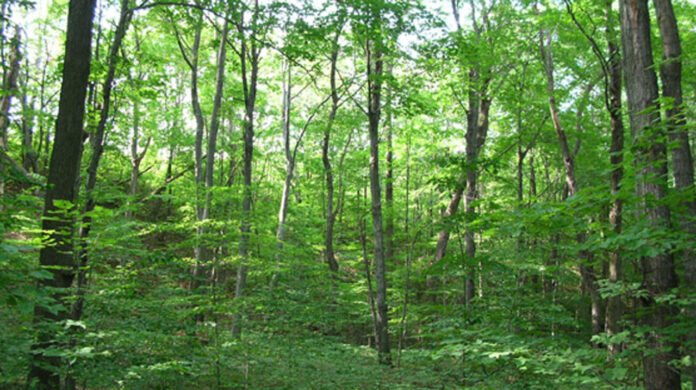Stakeholders seek logging ban to boost reforestation in northeastern Nigeria
Some stakeholders in the environment sector have urged state governments in Nigeria’s northeastern region to boost the ban on illegal felling of trees to enhance reforestation and check desert encroachment.
The stakeholders who spoke in Adamawa, Bauchi, Borno, Gombe, Jigawa and Yobe, said the measure was imperative to check spate of forest depletion and protect about 10 million trees planted by the states in the last three years.
The states are among the 11 desert prone areas alongside Kano, Katsina, Kebbi, Sokoto and Zamfara States.
The News Agency of Nigeria (NAN) reports that tree planting is a critical component of the National Afforestation Programme and the National Agency for Great Green Wall (NAGGW), designed to control desertification, erosion and build a sustainable green environment.
To further protect forest resources, the state governments also adopted proactive measures to check indiscriminate felling of trees and bush burning.
READ ALSO: NEPC begins promotion of pigeon pea production, value chain in Kaduna
These measures were being evolved to encourage development of alternative sources of energy to reduce dependence on fuel wood.
Mr Ali Abba, Head of Forestry Technology Department, College of Agriculture, Gujba in Yobe State, said effective reforestation would mitigate desert encroachment ravaging the region.
Reforestation is the process of replanting a damaged forest area for the benefit of mankind and environment.
According to him, reforestation fights desertification by increasing soil fertility and the level of its organic matter.
“Reforestation also slows down global warming by reducing carbon dioxide in the atmosphere,” he said.
He said reforestation was critical to addressing climate change, adding that areas with lots of trees experienced more rainfall than those without vegetation cover.
Abba urged the Yobe government to maintain the 3,000 000 tree seedlings planted across the state under its afforestation programme.
READ ALSO: Yobe raises 3 million tree seedlings to fight desertification
He, however, advised the government to scale up tree planting in areas such as Yusufari, Yunusari, Geidam, Machina, Dapchi, Tarmuwa, Nguru and Damaturu.
The aforementioned areas, he said have been experiencing low rainfall in the last 30 years due to depletion of vegetation.
A Gombe-based environmentalist, Mr Ismail Bima, also urged residents of the state to support the government’s afforestation programme.
Bima, who is the Chief Executive Officer, Jewel Environmental Initiative (JEI), an NGO, said the call became imperative in view of the large scale destruction of forest resources in the state.
He said community engagement was necessary to ensure success of reforestation programme at the grassroots, and stressed the need for awareness creation activities to mobilise support for the programme.
Bima said government had embarked on massive tree planting across the state under its “Gombe Goes Green (3G) project aimed at planting one million trees annually.
“The best that could be done is to nurture the trees planted in our communities.
“It is the role of the people to own up all projects in their communities because the benefit of having those trees will be enjoyed first by the community where the trees are,” he said.
He advised the people to seize the opportunity of the wet season to plant more trees in their communities to reclaim lost forest.
Also, Dr Salami Kaseem, Department of Forestry and Wildlife, Federal University Dutse (FUD), Jigawa, said massive tree planting would speed up reforestation across the country.
He said that cutting down of trees without immediate replacement damaged the habitat, loss of biodiversity and aridity.
Kaseem said that deforestation for land clearing, farming, charcoal making and logging without tree replacement was counter-productive and harmful to the environment.
“Cutting down of trees without replacing them affects humans, ecosystem and the climate because trees are the main source of oxygen.
“Trees also have many advantages such as providing shade from the sun’s harmful ultraviolet rays and maintain the ecosystem.
Kaseem further said that deforestation caused loss of habitat for species, animals and plants inhabiting the forests, as such they could not survive.
He said logging ban was the most effective way to enhance reforestation and management of forest resources.
In the same vein, Tukur Dalorima, an environmentalist in Borno, urged the state government to enact forestry laws to check indiscriminate felling of trees.
He said that Nigeria lost large area of forest to logging, desert encroachment and other human induced activities.
The trend, he said, contributed to global warming, desertification, erosion and harmful effects to the ecosystem.
“We witnessed desert encroachment in the north where about 350,000 hectares of land are being lost annually, and Lake Chad is shrinking.
“Governments at all levels and other stakeholders in the environment sector must encourage tree planting to guard against deforestation and mitigate effects of climate change,” he said.
He urged the Borno government to develop erosion control and environmental sustainability manual to guide community based erosion control programme.
Similarly; Mr Ibrahim Kabir, Director-General, Bauchi State Environmental Protection Agency (BASEPA), said it had planted 550,000 assorted trees covering about 53,000 hecters across the state.
He said the Agency recently distributed 2,000 tree seedlings to households for planting in Bauchi metropolis, to control desertification and promote the concept of green area.
According to him, the state government will access N30 billion grants from World Bank, adding the state was expected to contribute N1billion as counter part fund, to address myriads of environmental challenges.
Moreso; Alhaji Hamisu Shira, Commissioner for Housing and Environment, said the ministry had planted 970 assorted tree species in strategic locations across the 20 LGAs, to conserve the environment.
He said the ministry equally planted additional 9,500 trees in Giade, Shira, Zaki and Tafawa Balewa LGAs, to enhance reforestation and environmental sustainability in the state.
For her part, Mrs Sarah Gundiri, Director Forestry, Adamawa Ministry of Environment and Natural Resources called for more sensitisation activities to create awareness on reforestation at the grassroots.
She stressed the need for engagement of community and religuous leaders in educating the people to embrace tree planting for better life.
She said the importance of reforestation to biodiversity and ecosystem could not be over emphasised.
Follow the Neptune Prime channel on WhatsApp:
Do you have breaking news, interview request, opinion, suggestion, or want your event covered? Email us at neptuneprime2233@gmail.com





